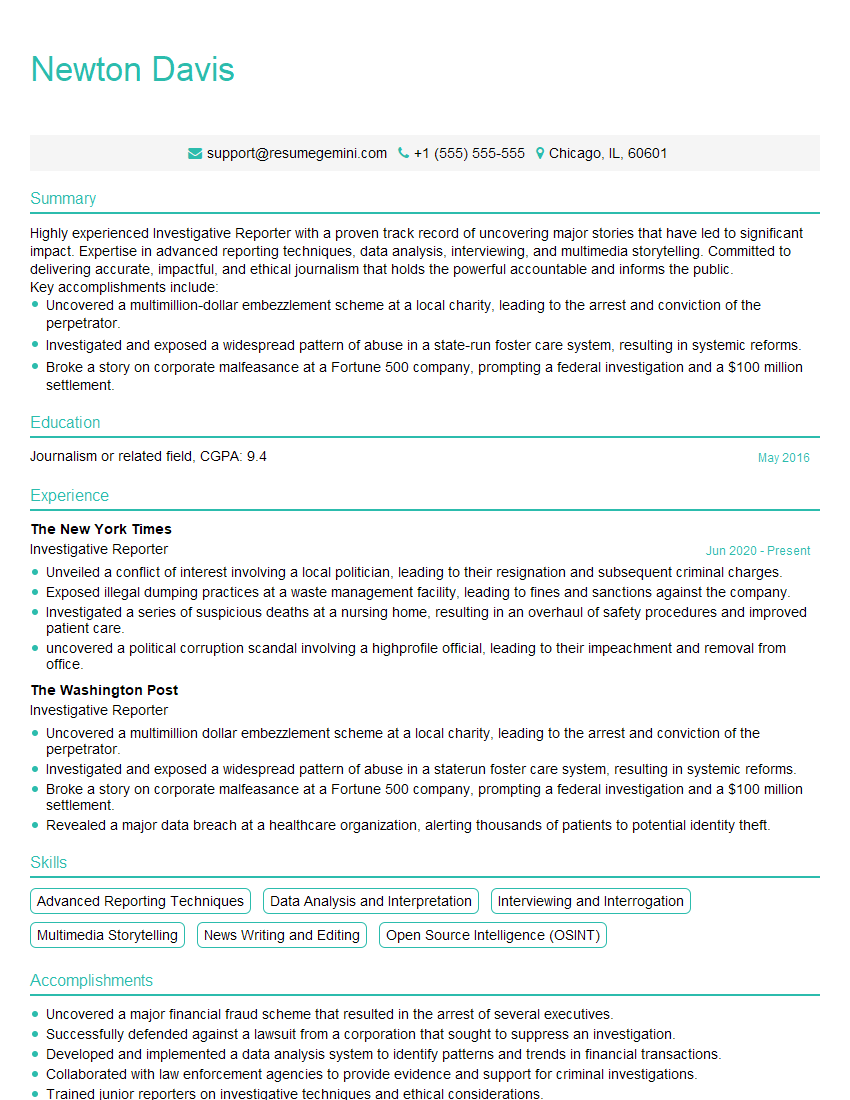Are you a seasoned Investigative Reporter seeking a new career path? Discover our professionally built Investigative Reporter Resume Template. This time-saving tool provides a solid foundation for your job search. Simply click “Edit Resume” to customize it with your unique experiences and achievements. Customize fonts and colors to match your personal style and increase your chances of landing your dream job. Explore more Resume Templates for additional options.

Newton Davis
Investigative Reporter
Summary
Highly experienced Investigative Reporter with a proven track record of uncovering major stories that have led to significant impact. Expertise in advanced reporting techniques, data analysis, interviewing, and multimedia storytelling. Committed to delivering accurate, impactful, and ethical journalism that holds the powerful accountable and informs the public.
Key accomplishments include:
- Uncovered a multimillion-dollar embezzlement scheme at a local charity, leading to the arrest and conviction of the perpetrator.
- Investigated and exposed a widespread pattern of abuse in a state-run foster care system, resulting in systemic reforms.
- Broke a story on corporate malfeasance at a Fortune 500 company, prompting a federal investigation and a $100 million settlement.
Education
Journalism or related field
May 2016
Skills
- Advanced Reporting Techniques
- Data Analysis and Interpretation
- Interviewing and Interrogation
- Multimedia Storytelling
- News Writing and Editing
- Open Source Intelligence (OSINT)
Work Experience
Investigative Reporter
- Unveiled a conflict of interest involving a local politician, leading to their resignation and subsequent criminal charges.
- Exposed illegal dumping practices at a waste management facility, leading to fines and sanctions against the company.
- Investigated a series of suspicious deaths at a nursing home, resulting in an overhaul of safety procedures and improved patient care.
- uncovered a political corruption scandal involving a highprofile official, leading to their impeachment and removal from office.
Investigative Reporter
- Uncovered a multimillion dollar embezzlement scheme at a local charity, leading to the arrest and conviction of the perpetrator.
- Investigated and exposed a widespread pattern of abuse in a staterun foster care system, resulting in systemic reforms.
- Broke a story on corporate malfeasance at a Fortune 500 company, prompting a federal investigation and a $100 million settlement.
- Revealed a major data breach at a healthcare organization, alerting thousands of patients to potential identity theft.
Accomplishments
- Uncovered a major financial fraud scheme that resulted in the arrest of several executives.
- Successfully defended against a lawsuit from a corporation that sought to suppress an investigation.
- Developed and implemented a data analysis system to identify patterns and trends in financial transactions.
- Collaborated with law enforcement agencies to provide evidence and support for criminal investigations.
- Trained junior reporters on investigative techniques and ethical considerations.
Awards
- Investigative Reporting Award from the National Press Club for exposing corruption in the local government.
- Pulitzer Prize for Investigative Reporting for a series on the environmental hazards of a chemical plant.
- George Polk Award for Investigative Reporting for uncovering a political scandal that led to the resignation of a major politician.
- National Headliner Award for Investigative Reporting for a series on healthcare fraud.
Certificates
- Certified Investigative Reporter (CIR)
- Certified Fraud Examiner (CFE)
- Certified Information Systems Security Professional (CISSP)
- Certified Public Accountant (CPA)
Career Expert Tips:
- Select the ideal resume template to showcase your professional experience effectively.
- Master the art of resume writing to highlight your unique qualifications and achievements.
- Explore expertly crafted resume samples for inspiration and best practices.
- Build your best resume for free this new year with ResumeGemini. Enjoy exclusive discounts on ATS optimized resume templates.
How To Write Resume For Investigative Reporter
- Tailor your resume to each job you apply for, highlighting the skills and experience that are most relevant to the position.
- Showcase your investigative reporting skills by providing specific examples of your work in your resume and cover letter.
- Demonstrate your commitment to accuracy and ethical journalism by including references to any awards or recognition you have received.
- Network with other journalists and professionals in the field to learn about potential job opportunities and develop valuable contacts.
Essential Experience Highlights for a Strong Investigative Reporter Resume
- Conduct thorough research and investigation to uncover stories of public interest.
- Develop and maintain sources, including confidential informants, to obtain exclusive information.
- Analyze data, documents, and other evidence to identify patterns and uncover wrongdoing.
- Conduct interviews with key individuals, including witnesses, whistleblowers, and experts.
- Write and produce compelling news stories, articles, and multimedia content that inform and engage the public.
- Collaborate with editors, producers, and other journalists to ensure accuracy, fairness, and impact.
Frequently Asked Questions (FAQ’s) For Investigative Reporter
What are the key skills required to be an Investigative Reporter?
Investigative Reporters need a strong foundation in reporting techniques, data analysis, interviewing, and writing. They should also be proficient in using open source intelligence (OSINT) tools and have a deep understanding of ethical journalism practices.
What are the career prospects for Investigative Reporters?
Investigative Reporters can advance to positions such as Editor, Producer, or Bureau Chief. They may also become authors or work in academia or non-profit organizations.
What are the challenges faced by Investigative Reporters?
Investigative Reporters often face challenges such as accessing confidential information, dealing with hostile sources, and protecting their own safety. They must also be prepared to work long hours and handle stressful situations.
What are the ethical considerations for Investigative Reporters?
Investigative Reporters must adhere to strict ethical guidelines to ensure accuracy, fairness, and objectivity in their reporting. They must also protect the privacy of sources and avoid conflicts of interest.
How can I prepare for a career as an Investigative Reporter?
To prepare for a career as an Investigative Reporter, you can pursue a degree in Journalism or a related field, gain experience through internships or freelance work, and develop strong research and analytical skills.